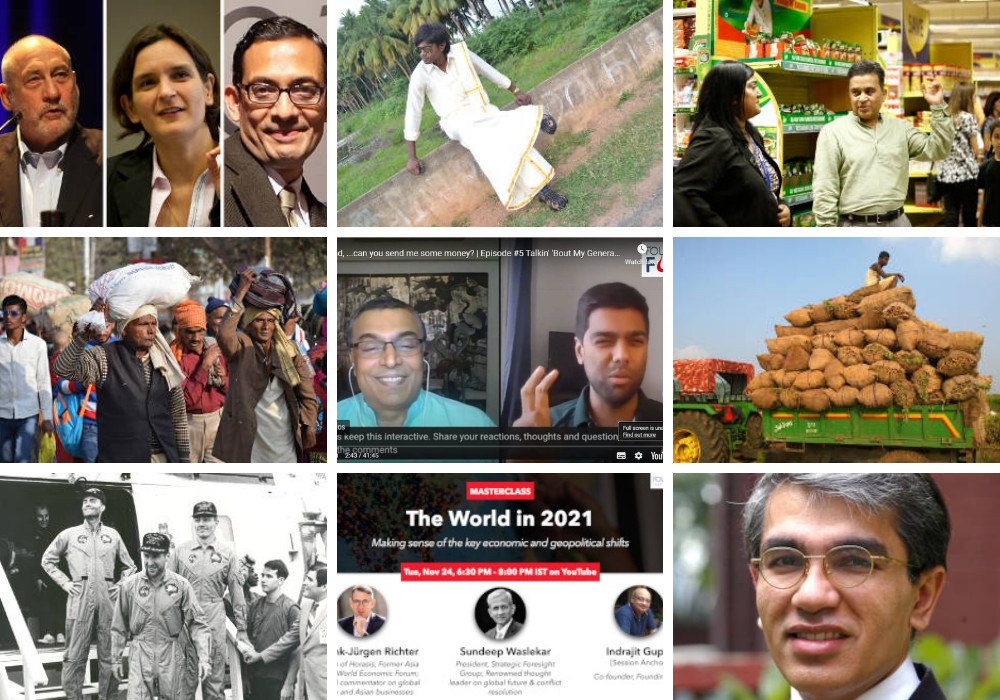Dear friend,
When history will be written, how will 2020 be remembered?
While the pandemic may occupy many pages, there are other stories to be told as well—of resilience, innovation and narratives of entities and people who discovered new paths and experimented to tackle issues that predated Covid-19.
Founding Fuel’s Best Stories of 2020 is an attempt to chronicle all of these changes and responses. The 50-plus stories that we recorded in collaboration with our extended network, places the year in perspective—the chaos, slivers of opportunity—and an inkling of the things that may matter in the New Year.
Where we were as 2020 began
In the beginning of 2020, our editorial calendar was focused on the economic slowdown choking India. The attempt was to understand what the interrelated issues are, and how is the average Indian faring?
1. Who do economists serve, really?

Mainstream economic theories do not fit reality. Instead of treating people as data, listen to them, and find answers to their real problems for inclusive, sustainable progress, says Arun Maira. He builds his argument based on two books, Measuring What Counts (co-authored by Joseph Stiglitz) and Good Economics for Hard Times (by Esther Duflo and Abhijit Banerjee).
One of the examples Maira cites is labour. He writes:
“The concept of a market for labour is controversial. ‘Labour’ is provided by human beings. Commodities can be bought and sold in markets. Humans are not commodities to be traded for prices determined by supply and demand, which they were in the slave trade…. Humans are not fodder for an economic machine to increase its GDP. They must be the principal beneficiaries of the growth of GDP. Economists must be reminded, says Stiglitz, that the purpose of economic growth is to improve the well-being of humans….
“Humans are stripped of their humanity when, in economists’ mathematical equations of resources and outputs, ‘labour’ appears as an input like any other.”
2. Masterclass: India is hurting. Why? What next?
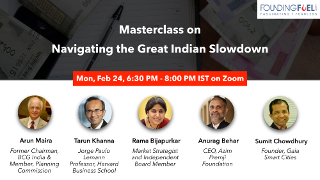
There was much concern about the economic morass India was sinking into. This Masterclass with Rama Bijapurkar, Tarun Khanna, Anurag Behar, and Sumit Chowdhury, moderated by Arun Maira, was held in February. The insights and questions this conversation surfaced remain relevant because many of the issues are endemic—and need urgent attention.
Local systems solutions, investments in healthcare and public institutions, cross-pollination of ideas—the panel discussed how to extract the economy out of the morass it is in.
Here’s an excerpt from the synopsis:
- We've known for a while that we have been building this great consumer-led economy on shifting sand.
- Outside of the top 20-25% of people, also called the middle class, nobody really has any surplus income. This makes large parts of the economy extremely vulnerable.
- When we say the rural markets are growing, basically half of India's rich live in rural areas, as do most of India's poor. So we're managing to tap the better-heeled people in rural India as well.
- There’s a steady decline in the poorer districts; there’s a sense of helplessness in the agrarian economy.
- In the past 12-18 months, there’s been a steady fall in migration to the bigger cities—the employment generation magnets.
3. Despatches from Surat: There’s gloom, but no doom here

How is the average Indian doing? Piyul Mukherjee, and her team at Quipper, provide a ground-level view of the state of the economy through their Ground Realities series, which covered Surat and Indore before the pandemic hit.
This story, a deep dive into the lives of a few Surat residents, shows a microcosm of the Indian story.
Here’s an excerpt—vegetable vendor Gullubhai Yadav’s story:
“Come 6 pm, the sabzi mandi next to the New Bombay Textile Market would begin to swarm with customers. Staff from the textile stalls and shoppers alike would stop by to buy vegetables on their way home.
But there are no crowds today. “We hardly see any customers in our market. Kisike paas paisa hi nahi hai [No one has any money],” says Gullubhai…
Surat is mostly vegetarian, and sales earlier were high—with regular customers purchasing at least Rs 100 worth of vegetables each day.
But now, his purchase price has skyrocketed—everything is Rs 50+ a kilo…. “People are buying do number ki sabji [the colloquial term for overripe, old vegetables sold at a discount]” ….
Back in the village, the family gets benefits via government schemes—that at least keeps them from going hungry. Subsidies aimed at the poor do not reach them in the city as they have no records to show that they are residents of Surat….
He’s teetering at the brink but hasn’t lost hope. “Aaj mehngai hai par kal nahi hogi. Mausam aata jaata rehta hai [Today prices are high, tomorrow they won’t be. Seasons change.]”
(And don’t miss their account of how Surat’s small entrepreneurs responded to the migrant labour crisis that would unfold just a few months later.)
Grappling with sudden, crippling change
Then the pandemic happened—and a lockdown was enforced. It knocked down all calculations and projections. This bunch of stories tried to find meaning in the chaos and attempted to discover survival strategies. As Arun Maira wrote, “When the storm has passed, what is the shape of the new economy we will build? … Why should we talk about the future when we are struggling to survive through a pandemic, whose course we seem powerless to change? We need to strengthen ourselves emotionally. We need hope.”
4. WFH: Drinking from a fire hose

As India went into the first 21-day lockdown, Kavi Arasu cautioned that we’ve been pitchforked into action without any processes or established ways of working that we know of. What must leadership teams do right now to handle this disruption? (Even as the lockdown was imposed in India, it was slowly ending across China and the Far East—and their experience offered glimpses of the future too.)
Kavi wrote: “First off, the temptation that we must guard against is to think of this as ‘Work from Home’, where work has a new location to get done from—home. No! This is a fundamental disruption of everything we know, including good old ‘work from home’….
[Employers shipped desktops to employees’ homes] They soon realised that work and work processes were not built for work from home. Shifting the infrastructure home is the easier part. Porting work home for a few months is a tough ask. Neither is the home ready to accommodate full-time work nor has the work been designed that way for many.”
And months later, we are still figuring out the new ways of working!
5. How Corporate India needs to think about managing the pandemic
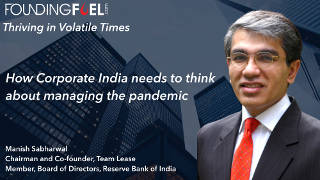
Manish Sabharwal has been watching what’s going on in the economy, in society, and in government from multiple vantage points. In early April, we asked him about the possible scenarios and how business—and indeed the country—must sequence and calibrate a response.
One of the things he said is: “The right sequence of response is, first deal with the virus, then deal with poor citizens, then deal with the economy, then deal with employers and then deal with the financial system”
Listen to this clip where Sabharwal talks about that in some detail:
Stories of innovative response—to adapt and revive
Even as a jargon often used in business—VUCA (volatile, uncertainty, complex and ambiguous) world—was making itself painfully evident, many entrepreneurial leaders, even in March, were beginning to experiment and discover opportunities. Our The Reset series dives into some of the industry-wide experiments.
6. The Satara uprising
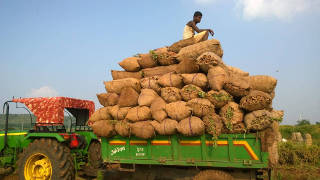
Anmol Shrivastava wrote about one such experiment in Satara: Across Maharashtra, fresh farm produce was rotting after supply chains were disrupted by the national lockdown. The local administration in Satara district offered a window of opportunity to small farmers’ collectives to build a farm-to-home model—and dramatically turn the tide.
Anmol writes:
“The migrant labour to cut and lift the yield had disappeared. And so had the truck drivers who transported fresh produce from mandis to the markets… leaving most of it to rot on the fields....
[Dr Avinash Pol, a seasoned social worker and a key figure behind this initiative] offered the small farmers wise counsel…. “your primary business is not to sell crops. It is to invest in human capital. This is a great chance not just to serve the residents of Satara during the lockdown, but to address a long-term business opportunity where you can build a direct bond with your customers.”
7. Stories from inside India’s corporate war rooms

Meanwhile, Indrajit Gupta spoke to CEOs across industries to understand what they were going through. He asked them how they were grappling with the operational aspects of the crisis as they prepared for a post-Covid-19 world.
Five learnings from these one-on-one conversations emerged.
8. Retail Reset: Lockdown lessons from Reliance Retail
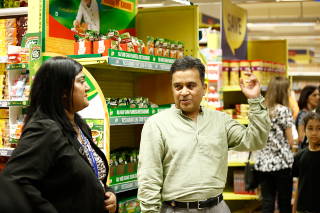
Indrajit Gupta and Anmol Shrivastava spoke to Damodar Mall, CEO of the grocery business at Reliance Retail to listen in on his learnings from managing anxious employees, customers, and their evolving needs over three months of the lockdown.
Listen to this clip where Mall talks about how Reliance Retail’s role evolved during the lockdown.
9. So, who or what is mofussil?
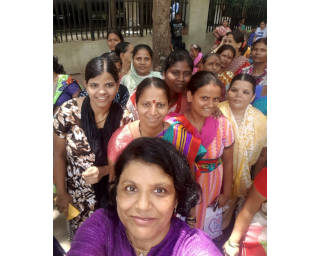
India’s small towns were also moving beyond the Bunty-Babli stereotype as they emerged as new labour hubs in the post-Covid world. Piyul Mukherjee and Ipsita Bandyopadhyay spoke with Meenakshi Jain, founder of Helper4U to understand this phenomenon.
They quote Jain:
“… domestic labour, or indeed labour of any kind, had been a mostly one-way street, flowing from impoverished no-name small towns to the cluster of slums and labour camps dotting India’s urban metropolises.
But the pandemic is changing things.
“Have you heard of Morbi? Well, it’s a town in Kathiawar, Gujarat, with a lot of wealthy people. A family from there connected with us saying they need a babysitter for their little daughter. They are willing to pay up to Rs 30,000 per month and fly the person down from wherever she is right now,” says Jain…
Contrary to popular belief, it is not just the main metros that power the economy…. Many residents spread thin across India’s small towns also have significant access to wealth, and they are beginning to connect to the platform economy.
10. How to brand a humble piece of white cloth

The Growth Factor newsletter curated by NS Ramnath explored the some of the biggest questions around small businesses, through stories, data points, and giving context to news. One such story is of how Ramraj Cotton veshtis became a brand.
Ramnath writes:
The founder of Ramraj Cotton, R Nagarajan, knows the exact moment when he decided to step up advertising. Once he and his friends had come to Chennai to attend a wedding in the family of a mill owner. The wedding took place in a 5-star hotel in the city. As his group (everyone dressed in Western clothes, save Nagarajan who was in his dhoti and shirt) entered the hotel, the security guard denied him entry. He convinced his friends to go ahead, and spent the next couple of hours in the hotel garden, thinking about what happened to him. He concluded that unless the perception of veshti changes, he would never be able to build a business.
Grappling with anxiety and uncertainty
As Ramkumar’s article portrays, the stress on individuals, across hierarchies and walks of life, was beginning to be debilitating. How do you step back, find the calm he spoke about, and centre yourself?
11. Lessons in crisis leadership from four stories of survival

K Ramkumar looked at history to find stories of how leaders defied life-and-death crises. He found inspiration in Sully Sullenberger, who had to crash land a plane in the Hudson River; Capt. James Lovell and Gene Kranz from the Apollo 13 mission; polar explorer Ernest Shackleton; and US President Franklin D. Roosevelt, who led America out of the Great Depression.
Ramkumar writes about Shackleton:
“Calm and a clear, unwavering mind is the pivotal factor to signal control to the team and those who will be impacted.
It also allows one to establish focus, compressing time and space to the core and the immediate. It allowed Shackleton to recognize that with his ship crushed by compressing ice, his vision of being the first man to walk across the Antarctic to the South Pole was no longer possible. He reframed the mission objective to saving all lives.
The glory of the mission can wait. Survival and return to fitness come first. And the time available to act is not the usual five years. It is the next 90 days, and as the situation changes, the next 180 days, maybe even the next 12 months.”
12. Stability in the storm: Reflections in challenging times
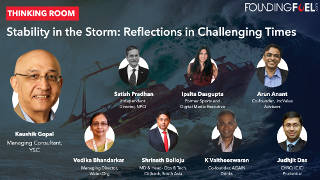
The first conversation in our new series, Thinking Room, was led by Kaushik Gopal, a business psychologist who has worked as an executive coach and a consultant in leadership. Finding the right path when all is murky is a special challenge today. Deep listening and deep conversations can throw light. This facilitated conversation did just that.
Watch this clip on the two characteristics of leaders that make a big difference:
The impact on workers
One of the most poignant scenes that we’ll remember for years to come, is of workers walking back hundreds of kilometers to their villages, as income dried up and hunger reared its head. This and the suspension of labour laws by some states brought into stark relief just how vulnerable Indian workers are (Arun Maira called it ‘the used and discarded workers of India’) and the true reforms we need. And this excellent session with Madan Padaki, Gayathri Vasudevan, Arun Maira, and Devangshu Dutta—on labour migration, jobs and society in the Age of the Pandemic—explores what will it take workers in the informal sectors and small businesses to survive?
13. Suspending labour laws means paving a road to nowhere

K Ramkumar wrote that far from bringing in new business, the wholescale suspension of labour laws by some states poses a real danger of unleashing mistrust among factory workers. For the move is fair neither to workers nor to employers
He wrote:
“In effect, the move rolls back by a hundred years employees’ and trade unions’ hard won protections and legal rights. It is foolhardy to expect that they will play ball.”
And on the need for reform:
“Everyone agrees that the plethora of labour laws should be rationalised. The blueprint for it has been ready for over 20 years…. The issue has been the lack of will with the successive governments. The proposal is to have three comprehensive labour legislations:
- Industrial Relations (note, not disputes) Law
- Conditions of Work Law
- Social Security Law”
Understanding the shifts—and the role of technology
Covid-19 was disrupting all aspects of life—how do you now think about an MBA when courses are offered remotely? How are tech giants thinking about shifts in consumer behaviour? How do we think of and deploy technology that is at the centre of it all? As businesses look to milk the opportunity, data privacy and data protection is something they can no longer ignore.
As our Masterclass: Shaping Startup Culture, revealed, ‘we are customer-driven’, ‘we are data-driven’ are typical refrains from companies. But are they really?
14. Masterclass: The Future of the MBA
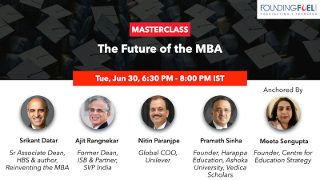
There are urgent issues emerging around the need for an MBA as a vehicle for social good. Covid-19 accelerated the pace of digitalisation by at least 5-10 years across many businesses. This too is forcing B-schools to revamp their curriculum and make it future ready. The panel included Srikant Datar, Ajit Rangnekar, Nitin Paranjpe, and Pramath Sinha, and was anchored by Meeta Sengupta. (As a precursor to the Masterclass, Meeta Sengupta’s column tackled the question ‘MBA or work? What should you choose in shaky times?’)
Watch this clip, where Srikant Datar, Dean at Harvard Business School, talks about the skills leaders of tomorrow will need to “operate in the gap”.
15. The race to build a ‘desi’ Super App

Haresh Chawla’s article is a must-read for anyone keen to understand India’s digital economy. He talks about why the Tatas, global tech giants like Google, WhatsApp and Amazon, and the behemoth that is Reliance Jio are rolling their sleeves up for a slugfest.
“Everyone has the same trophy in their sights: India’s massive internet user base, the second largest in the world. The race to dominate and divvy up the stakes in India is modelled along what happened in China, where Super Apps from Tencent (WeChat) and Alibaba have become de facto gateways for consumers and neatly shared the spoils between them….
“the Super App is that Holy Grail of the internet economy that just keeps giving. A self-perpetuating, high-velocity flywheel of consumers, transactions and services.”
16. Platforms in a Post-COVID World: Masterclass with Sangeet Paul Choudary
Meanwhile, as was amply clear from our stories of innovative responses, the pandemic is leading to fundamental shifts in behaviours. What does that mean for platform businesses? Are there opportunities for incumbents to reimagine business models? And how can country-level platforms help countries gain an advantage in the global arena?
Here's as excerpt from the synopsis:
“Countries as platforms
- Country-level platform strategies are a way to increase competitive advantage for countries in a global, connected world.
- For country-level platform strategies, they need to think like the Android model, which has three elements:
- an open infrastructure (the Android OS)—what could be open infrastructure?
- a control point (Google Maps)—what could be a key control point?
- and neutrality—how could they be neutral so that they have an important geopolitical position?”
17. Behind the data breach at BigBasket

Charles Assisi’s story behind the data breach highlights why data security is and will be increasingly important for Indian firms—and why India needs a data protection law urgently.
Interesting fact #1: BigBasket is not alone, there has been a spate of data breaches at other digital entities in recent months. Interesting fact #2: One name, Cyble Inc, comes up every time—they're the ones that have revealed the breach every time. What's going on? And what can those in the digital economy do about it?
“Here’s the issue: Why did Menon and Sharma have to go to the police against Arora or threaten legal action against Cyble? Because technically, Cyble has done nothing illegal. It discovered breaches at BigBasket and Paytm Mall, informed the management, and placed the information in the public domain.
“If anything, customer data has been compromised and the onus is on entities such as BigBasket and Paytm to let people know about it.”
People—exploring generational differences
It’s a truism to say that people—as consumers, as users, as employees—are at the heart of all these shifts. That thought seeded our series, Talkin’ ‘Bout My Generation—a Facebook Live show, accompanied by a column. We completed two seasons, and were hard-pressed to pick favourites. But since we must, for this list, here are two.
18. Dad… Can you send me some money?
In Season 1, Episode 5, ad industry veteran Vijay Bhat and his son Shravan talk money—a subject that’s rarely discussed in Indian families. What value do the two generations place on money, especially in tough times? And how early should you talk about it in the family?
Watch this clip from the episode:
19. Music and life
In the finale of season 2, the Pauls—BBDO’s chairman Josy, doctoral student Shlok, and jazz and gospel singer Marie—share their journey of how music influenced their lives. It turned out to be a truly magical session—don’t miss it!
Watch this 2-minute promo video:
Making sense the New World
20. Masterclass: The World in 2021
What were the big changes—beyond Covid-19—that 2020 ushered in? And what can we expect in 2021? An exercise in sensemaking with Frank-Jurgen Richter, Sundeep Waslekar, Niranjan Rajadhyaksha, and G Venkat Raman surfaced much of what ought to have dominated the headlines but did not.
An excerpt:
Sundeep: The China-US tech race is for high technology, not digital technology…. petaflop computers, space science… China landed a probe on the other side of the Moon. It is now preparing for a probe to collect samples from the Moon. It has already developed an ASAT [anti-satellite] weapon.
If Elon Musk is putting out 15,000 satellites in outer space, and introducing a new internet, the Chinese with their space power, can demolish that in the case of a war in a fraction of a minute….
Frank: China is no longer a me-too economy, just copying things. It is really at the forefront of development….
America wants to decouple China, isolate China. And you've seen Trump's rhetoric saying that Chinese tech companies can't use American-made chips anymore… putting companies like Huawei in a very difficult situation. But maybe it's a bit like a Sputnik moment for China because Huawei and other tech companies have to develop their own technology. And Huawei is doing exactly this, developing its own standards.
(Also read G Venkat Raman’s 2-part article on the ways in which the US-China tech war will affect India and the world: Part 1 and Part 2.)
The personal and the professional
The pandemic highlighted the importance of balancing the personal and professional, and more importantly, showed how tightly they are intertwined. The walls that we erect between our personal and professional lives are illusory, and doesn’t take into account how significantly one influences the other. These stories show how personal ambitions can shape politics, how personal interactions can reveal sophisticated management concepts and why one has to fight personal demons to achieve professional excellence.
21. The significance of the Bihari
Charles Assisi’s deep dive with Sankarshan Thakur, National Affairs Editor at The Telegraph, on the Bihar elections 2020 shows how deeply three personalities influence the state—Nitish Kumar, Lalu Yadav, and Prime Minister Narendra Modi.
Watch this clip from the conversation on “the teflon coating” to Modi’s image:
22. Clayton Christensen: The man who changed how we see disruptive innovation

In a deeply personal tribute, Neelima Mahajan remembers the man, his ideas and body of work, through a professional association spanning 15 years.
She writes:
It was in 2010 that Christensen turned his strategy viewfinder from business to life. In 2010, he addressed the graduating class at HBS on how they could apply his principles to their personal lives. In a world where everyone is struggling to find meaning, that lecture touched a chord. It led to an article in Harvard Business Review and then a book titled How Will You Measure Your Life? (with Karen Dillon and James Allworth). As he told Fast Company: “I believe that we can, in a deliberate way, articulate the kind of people we want to become. We can articulate the culture that we would want to exist in our family, and you can then, as the rest of life happens to you, you can utilize those things to help you become the kind of person you want to be.”
23. Masterclass: Personal Journeys with Ashish Vidyarthi
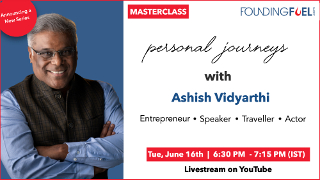
Which are the places you think you are not supposed to be in? This conversation with a creative entrepreneur and actor explored breaking out of comfort zones, channelling fear into audacity, and how to not become a voyeur of your own success.
Watch this clip where Vidyarthi talks about courage and audacity:

